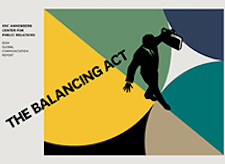 |
| Jane Genova |
Integrating ESG (Environmental Social Governance) principles into how corporations operate is scaring their general counsel. That is what the Rock Center for Corporate Governance at Stanford found.
Published on September 15, the Rock Center research documented the legal, regulatory, and reputational risks embedded in ESG. Sometimes ESG is referred to as the “triple bottom line.” That is, instead of the one-dimensional focus on the traditional bottom line, there is also accountability for the needs of people and planet earth.
Among the many understandings of “ESG” Investopedia’s is the simplest. Essentially, it classifies ESG as a set of criteria for measuring:
- How a company performs as a steward of nature (Environmental)
- How it manages its relationships with stakeholders ranging from employees to communities (Social), and
- How it creates policies for the leadership, audits, internal controls and shareholder rights (Governance).
All isn’t angst, though, for the general counsel. There is a sunny side. According to the study, 72 percent of general counsel recognize that investing in ESG does improve financial performance. Research on more than 2,000 studies of financial performance and ESG found either a positive relationship to financial performance or at least not a negative one. In addition, other research demonstrates that companies in the S&P 500 ranking in the top quintile for ESG factors did better than the bottom quintile by 25 percentage points.
That is the major reward part of the ESG development. The rest is what the general counsel perceive as risk. Big time. After all ESG is in a whole different box than the old-line corporate social responsibility which had been around for more than half a century. That primarily had entailed social issue marketing, employee volunteerism, and philanthropy. In contrast, ESG is relatively new. Advice is all over the place on how to do the triple bottom line effectively. But proven-out best practices have not yet solidified.
The Rock Center report abstract sums up the challenge this way:
“General Counsel … harbor significant concern for the legal and regulatory risk of these activities. General Counsel also express notable concern about the potential liability from disclosure of ESG activities, and the reputational and productivity costs caused by CEO and employee-driven activism.”
Yes, the general counsel’s major focus is on what the CEOs and the employee activists are up to.
As for the CEOs, the jitters are about what stances they might take on social justice and the policies which could be implemented.
As for employee activists, the most recent example of that is how Apple’s CEO Tim Cook was confronted with questions at an all-staff meeting. Those questions ranged from compensation to what Apple was doing about the Texas Abortion Law. The focus for the general counsel in that is how to classify and manage activism. Rock Center found that about half approached such a growing reality as a kind of standard workplace issue.
The key pressure points in ESG integration include:
- Boosting the financial commitment to diversity and related issues
- Assessing the social impact of corporate policies
- Being green
- Reviewing the wages paid to lower-level employees
- Creating sustainability programs.
Along the way on these, of course, is the disclosure piece. Given that they are lawyers, it is expected that would require caution about the release of information. Currently only 27 percent of companies make public the EEOC statistics they report to the government. Will employees demand greater transparency?
Increasingly, the general counsel will have to turn to their outside law firms for how to identify, interpret and manage the risk. In April 2020, the Big Law firm Paul Weiss had been an early adopter in spotting the corporate need for this kind of specialized service. Its chairman, Brad Karp, created its Sustainability & Environmental, Social and Governance (ESG) Advisory Practice. This is how Paul Weiss describes the service:
“Business leaders face greater pressure to increase their organizations’ resilience while simultaneously addressing social issues of importance to stakeholders. Our advisory practice helps companies navigate the legal, business and political ramifications of developing and implementing ESG initiatives. We advise on matters such as stakeholder engagement, corporate governance, crisis management, corporate social responsibility, sustainability, diversity and inclusion, ethics and compliance.”
Eighteen months later, no surprise, most large law firms have instituted some kind of ESG practice.
Obviously, law firms are entering what used to be primarily the territory of public relations firms. But because so much of ESG shapes branding there will be increased partnering between the two disciplines—law and public relations. When it gets to litigation, as has recently happened with one-time ESG darling Allbirds, what plays out in the court of public opinion could be more important than the realities of the points of law. So, clearly, the general counsel’s ESG concerns can open new opportunities for public relations firms.
Jane Genova helps organizations market and sell. That could be their products, services, causes, or ESG cred ([email protected]). She covers ESG developments on her syndicated blog Law and More.


 A growing number of consumers, company employees and even PR professionals now think companies should dial back on ESG initiatives, according to the latest Global Communications Report from USC Annenberg.
A growing number of consumers, company employees and even PR professionals now think companies should dial back on ESG initiatives, according to the latest Global Communications Report from USC Annenberg. Shareholders filed a record 535 environmental, social and governance resolutions for the upcoming proxy season, according to a report by As You Sow, Sustainable Investments Institute and Proxy Impact.
Shareholders filed a record 535 environmental, social and governance resolutions for the upcoming proxy season, according to a report by As You Sow, Sustainable Investments Institute and Proxy Impact. Americans agree that companies play a role in addressing some of the major social and political challenges facing our world today, but a stark partisan divide arises when it comes to what issues the private sector should try to solve—and how they do it.
Americans agree that companies play a role in addressing some of the major social and political challenges facing our world today, but a stark partisan divide arises when it comes to what issues the private sector should try to solve—and how they do it. Teneo has tapped Pia Heidenmark Cook, former chief sustainability officer for IKEA, as a senior advisor in its London office.
Teneo has tapped Pia Heidenmark Cook, former chief sustainability officer for IKEA, as a senior advisor in its London office. How doing the right thing builds brand loyalty and creates untold opportunities for communications professionals.
How doing the right thing builds brand loyalty and creates untold opportunities for communications professionals.


 Have a comment? Send it to
Have a comment? Send it to 
No comments have been submitted for this story yet.